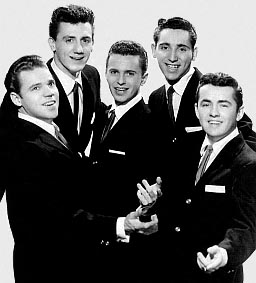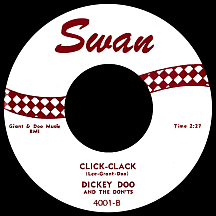DICKEY DOO AND THE DON'TS
Click-Clack
Dickey Doo didn't really exist. But the name can be connected to three people, one of them a newborn baby! Gerry Granahan, a singer, musician and the producer of several hit records in the late '50s and early '60s, often took a "throw-it-at-the-wall-and-see-if-it-sticks" approach. A native of the small northeastern Pennsylvania city of Pittston, he'd arrived in New York City mid-decade, worked as a demo singer and signed with Atlantic Records, appearing once on Atco as the leader of Jerry Grant and the Rockabilly Bandits. Gerry started hanging out with Dave Alldred, the drummer for The Rhythm Orchids (the Texas-based band that made many recordings in N.Y. and evenly split its output between lead singers Jimmy Bowen and Buddy Knox). Gerry and Dave came up with the idea for "Click-Clack" while riding the New York subway, basing the tempo and lyrics ('And the wheels go oom-ba-la-da-da, click-clack, click-clack...') on the rhythmic sound the train made on the tracks.
In the studio, Granahan decided to try a multiple-track technique (not unlike what Les Paul had done nearly a decade earlier), singing along with the audio to get more than the two tracks his studio's equipment was capable of. He produced several layers of lead vocals, two unnamed female singers were worked into the mix and somehow it all came together nicely. Gerry had interest from Tony Mammarella, who'd just started Swan Records with Bernie Binnick, though due to Gerry's Atlantic contract, he was unable to use his own name. Dick Clark, the so-called "silent" partner in the Philadelphia-based company, suggested "Dickey Doo," his nickname for infant son Richard Clark, Jr. Someone came up with a clever tag and Dickey Doo and the Don'ts were suddenly a thing. The publisher was "Grant & Doo Music," denoting the split-personality pairing of Grant (Granahan) and Dickey (also Granahan!) and Swan Records had its first release. Numerous spins (of course!) on Clark's recently-gone-nationwide TV series American Bandstand towards the end of 1957 practically guaranteed its placing in the top 30 in February and March 1958.

With that came the need for a physical "Don'ts" band to make personal appearances...and more records. Gerry rounded up some crack musicians and the act became reality with guitarist Ray Gangi, saxophonist Al Ways, bassist Harvey Davis and drummer Alldred, who would later claim the honor of being addressed as the distinguished "Richard A. Doo." Granahan took part as well, adding drumming to his expanding musical skill set, requiring a second full set of drums to be lugged around on tour so he could join Alldred for extreme percussion antics at the drop of a hat. The band went haywire with the follow-up, "Nee Nee Na Na Na Na Nu Nu," primarily a drum-pounding instrumental track with the title repeated (by cowriter Eddie V. Deane, sounding as juvenile and annoying as possible) as its only lyric. It hit the top 40 in May, holding at bay a version on Coral by Jonathan Winters and the Martians (apparently planting a seed that would grow into Robin Williams' "Nanu-nanu" bit from the early '80s sitcom Mork and Mindy, which costarred Winters). The single's other side was nearly as unhinged: Marion Smith's "Flip Top Box" conjures a grisly/funny image of '...a sly old fox...' who rigs up a coffin with a Marlboro cigarette pack-style lid for postmortem graveyard partying sprees.
Gerry, doggedly pursuing his solo ambitions while acknowledging his lack of success with "serious" fare, made an official complaint about the loose-fitting, figure-obscuring "sack dresses" popular at the time; "No Chemise, Please" crossed chart paths with Doo's "Nee Na" and "Flip Top" hits on its way to becoming a top 30 seller. As Granahan began separating himself from the group to work on other projects, the name underwent a slight spelling change ("Dickey" was henceforth "Dicky") and the free-form nature of the act became increasingly obvious. The next hit, "Leave Me Alone (Let Me Cry)," used the melody of the traditional 19th century song "John Brown's Body" and its sheet music pointed out the fact (the tune had also been used by Julia Ward Howe, who penned a patriotic variation, "Battle Hymn of the Republic," a surprise smash by The Mormon Tabernacle Choir precisely one year after Dicky Doo's self-indulgent ode to feeling sorry for oneself).
"Teardrops Will Fall" borrowed another traditional melody, "Our Boys Will Shine Tonight," a "fight song" still used by many high school and college sports teams. Its appearance on the national survey in February and March 1959 was the last for Dicky Doo and the Don'ts, who remained on the Swan label until 1960. The flip side of the band's final effort for the label was an instrumental, "The Drums of Richard A. Doo," revealing percussionist Alldred as the third designated Dicky Doo (spelling taken into account); the track was executed with the help of The West Texas Marching Band. But the Don'ts weren't done just yet. They signed on with United Artists and retained their unpredictable ways; "Teen Scene," a guitar-based instrumental written by Teddy Randazzo, was the leadoff single. "A Little Dog Cried," a sentimental spoken-word track with a biblical twist penned by Eddie Deane and Doo (likely Alldred but possibly Granahan), was the second and last on UA (a cover by Jimmie Rodgers overshadowed the original in the summer of '61).
Alldred and the other members of Dicky Doo and the Don'ts broke up shortly aftrwards. Granahan had kept himself busy in the meantime, producing hits for acts like The Fireflies ("You Were Mine") and the roster of artists (Janie Grant, The Angels and James Ray) on his own label, Caprice, from 1961 to '63. Later, without the participation of the original Don'ts, he made the stereotypical "desperate move" with a new recording, "Click-Clack '65." But it was unnecessary. His career was going fine and the band members had moved on. An unusual development came in 1977, when some unknown satirist released a mediocre "break-in" single paying tribute to (or ripping off?) the genre's master, Dickie Goodman, as well as Gerry Granahan's well-regarded Doo-group; "Rocky and the Angel" is a Rocky/Charlie's Angels novelty track issued under the name Dickie G. and the Don'ts.


